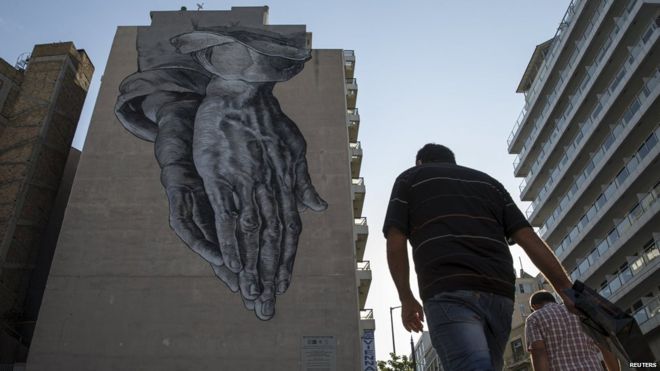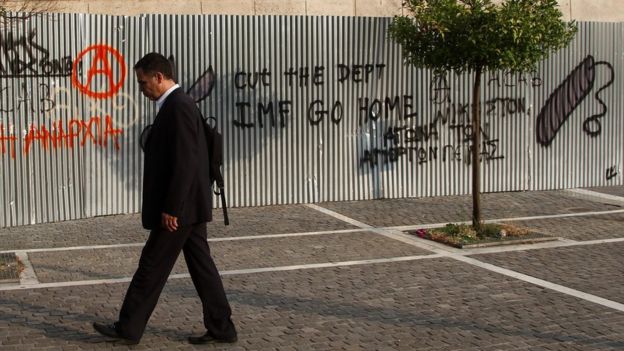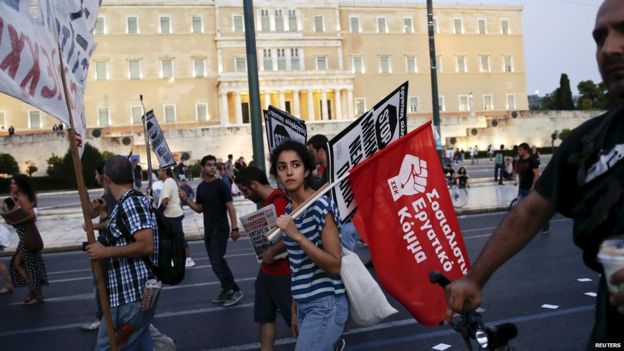
It is going to be 24 hours from hell for Greek bankers (and of course for the Greek people).
Senior bank executives tell me they have more than enough cash in their branches to meet whatever demand for withdrawals there may be today - and in fact they believe that the rate of withdrawals by worried customers will remain at a lower level than at the beginning of the week.
"We're OK" says one.
And what about next week? "There is going to be a deal [between the Greek government and its creditors]. That is certain".
His certainty is not based on the increasingly sceptical and wary tone of statements and comments from ministers and officials in Brussels, crucible of the negotiations.
It stems from financial logic. If there were to be no deal, the consequences for the Greek banking system would be cataclysmic - and the knock-on to the Greek economy would be dire.
Bankers have been warned by the Bank of Greece, the Greek central bank, that no deal means the probable end of emergency liquidity assistance, or the loans they receive both to finance withdrawals by worried investors and to fund vital short-term loans to the Greek government.
So it also means, they've been told (as if they needed telling), that the Greek government would have to impose capital controls - or severe limits on cash withdrawals - were the liquidity tap to be turned off.
However there would be several days of bank holidays, or branch and ATM closures, before customers were permitted to withdraw any money under the circumstances of capital controls - because legislation would need to pass through the parliament to impose such controls.
If you conduct a thought experiment about what it would mean if you woke up tomorrow to be told that there was no way of getting money out of your bank, you will understand why this is not a prospect any rational minister or banker would wish to contemplate.
Apart from the short-term blow to confidence and economic activity, the current drought of lending by banks would turn into a nuclear winter.

Greek businessmen tell me it is hard enough - and ludicrously expensive - for them to finance investment and exports right now. In the circumstances of capital controls, many Greek companies would collapse, because the banks would no longer have the capacity to provide any credit at all - pending the recapitalisation, or resurrection, of the banking system.
The point is that Greek banks not only have a liquidity problem, a chronic problem borrowing and taking in deposits. Their solvency would also be in question - because something like a third of all their loans are classed as "non-performing" (borrowers are struggling to keep up the payments) and because around a half of their capital resources are tax-refund claims (so-called deferred tax assets) on a government seen to be close to defaulting on its obligations.
So in the unlikely event that you have missed the point, today's talks in Brussels are not just about whether Greece can make its 1.5bn-euro payment to the IMF next week. It is about whether the Greek banking system can be maintained as a going concern.
But don't however conclude please that the Greek government has everything to lose and its creditors - eurozone governments, the ECB and the IMF - will be immune from harm if it all goes spectacularly wrong.
The damage to the eurozone, and indeed to the wider European Union, would be potentially devastating.
Here are just a few illustrations.
The hard and painful reality of the Greek banking system in turmoil would lead, inevitably, to capital shifting from banks in economies perceived to be weaker - Portugal, Spain and Italy, inter alia - to the stronger north, especially Germany.
This would increase the cost and decrease the availability of finance in those weaker economies, and stymie their nascent recoveries. It would also widen the damaging economic inequality between the eurozone's flourishing north and its struggling south.
Second, there would probably be colossal losses for the European Central Bank and therefore for eurozone taxpayers.
Having provided, directly and via the Bank of Greece, something like 120bn euros of loans to Greek banks, the ECB has in effect financed around 100bn euros of capital flight from Greek banks. Of this an estimated 45bn euros is cash under mattresses and buried in gardens, with the rest moved to overseas banks.
All of that cash and exported money represents hard "promises to pay" by the European Central Bank. By contrast the collateral it has received for its loans from the Greek government would be of questionable value.
The reputational damage to the European Central Bank, were it to incur severe losses, could imperil its primary responsibility - namely to maintain confidence in the euro as a store of value.

And finally, if you get back to that thought experiment of what it would mean for an entire banking system to be closed for days and impaired for months, it would be naive to expect anything but fury from Greek people. Recriminations would fly against their own government and - inevitably - against Germany and the rest of the eurozone.
Diplomats working in Athens have told me of their anxiety that there would probably be riots. There is a risk of political extremists seizing this bleak day.
Social breakdown in Greece, the cradle of civilisation, would be more than embarrassing for the European Union. If the EU means anything, it means a collective endeavour to provide peace and stability in Europe.
The only beneficiary, arguably, of Greek anomie would be a Russia under President Putin looking for new allies.
So just maybe Greek bankers are right when they tell me that agreement will imminently be reached between Greece and its creditors - because the alternative is nightmarishly unthinkable.
No comments:
Post a Comment